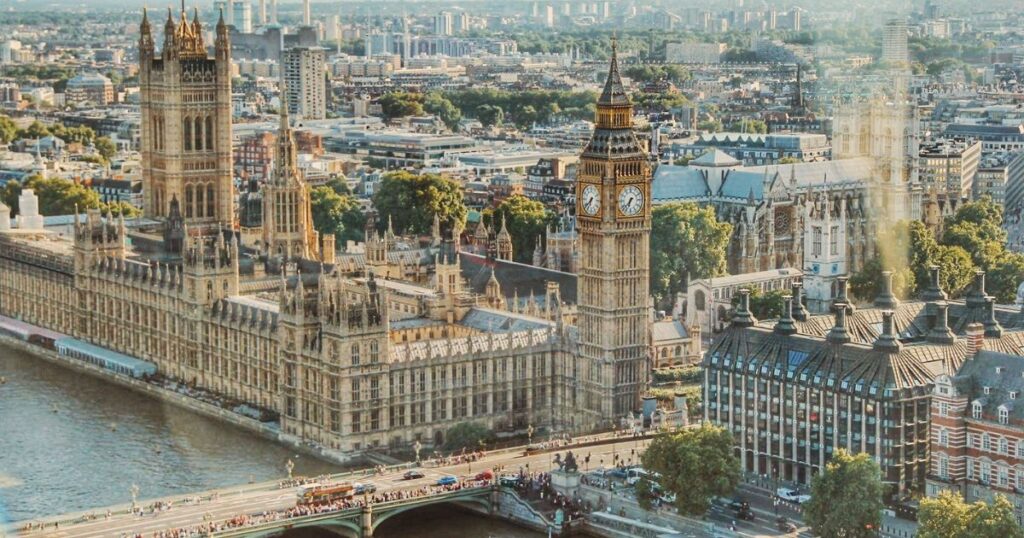If you’re getting ready to move to the United Kingdom, “UK vs. US taxes” will likely feature prominently in your research. Prospective US expats want to know: Do Americans pay more?
When considering this question, it’s important to research beyond income taxes. There’s much to consider, including sales and property tax differences between the countries.
It can feel daunting to try and analyze different tax systems to ascertain how to position yourself financially. That’s why we’ve created this article.
When you’re ready to crunch some numbers, this guide will help you calculate your total tax picture when you leave the US for the UK.
Understanding the British tax system
The British tax system applies to all countries in the UK: England, Scotland, Wales, and Northern Ireland. While there are certain nuances within the specific tax codes and regulations of each country (much like how the tax codes of US states may vary), there are overarching governing aspects of the British tax system.
Federal taxes
Before we get into tax rates, it’s worth mentioning the UK’s employee personal allowance. This is the amount of income that UK residents do not need to pay taxes on (similar to the US Standard Deduction).
For the 2024-2025 UK tax year, which starts on April 6th, 2024, and ends on April 5th, 2025, the employee personal allowance is:
- £242 per week
- £1,048 per month
- £12,570 per year
In some situations, you may be able to claim a greater allowance or additional allowances. Examples of potential scenarios include if you’re married, blind, self-employed, or earning income from renting out property.
A note implicating high earners in the UK:
The UK’s personal allowance decreases if you earn more than £100,000 per year — at £125,140 per year, you can no longer claim a personal allowance.
For most workers, anything above those thresholds is subject to Pay as You Earn (PAYE). These tax rates fluctuate based on how much you make, as well as where you live.
UK PAYE Tax Rates and Thresholds, 2024-2025
| England, Wales, & Northern Ireland basic tax rate | 20% on annual earnings up to £37,700 (~$47,043 USD) |
| England, Wales, & Northern Ireland higher tax rate | 40% on annual earnings from £37,701 to £125,140 (~$47,044 to ~$156,144 USD) |
| England, Wales, & Northern Ireland additional tax rate | 45% on annual earnings above £125,140 (~$156,144 USD) |
| Scotland starter tax rate | 19% on annual earnings up to £2,162 (~$2,698 USD) |
| Scotland basic tax rate | 20% on annual earnings from £2,163 to £13,118 (~$2,699 to ~$16,366 USD) |
| Scotland intermediate tax rate | 21% on annual earnings from £13,119 to £31,092 (~$16,366 to ~$38,800) |
| Scotland higher tax rate | 42% on annual earnings from £31,093 to £125,140 (~$38,801 to ~$156,144 USD) |
| Scotland top tax rate | 47% on annual earnings above £125,140 (~$156,144 USD) |
Provincial taxes
Fortunately, there are no local or provincial taxes on personal income in the UK.
Municipal taxes
There are municipal taxes in the UK, however, they are not based on personal income. Instead, they’re placed on businesses at a rate determined by the regional government.
In many cases, these taxes can be deductible.
Council Taxes
Property owners and renters in the UK may be subject to a council tax, which is similar to the US property tax. You can calculate this tax based on:
- The valuation band for your home in England and Wales or in Scotland
- How much your local council charges for that band
- Whether you can get a discount or exemption from the total bill
UK vs. US tax rates
So, how do British and US tax rates compare?
In order to compare US vs. UK income taxes, compare the below tables to the UK PAYE table described above. Note that the tables illustrate the tax rate depending on your filing status, so review according to your own.
US income tax rates for single filers
| Income Band (USD) | US Tax Rate |
|---|---|
| $0 – $11,000 | 10% |
| $11,001 – $44,725 | $1,100 plus 12% of anything over $11,000 |
| $44,726 – $95,375 | $5,147 plus 22% of anything over $44,725 |
| $95,376 – $182,100 | $16,290 plus 24% of anything over $95,375 |
| $182,101 – $231,250 | $37,104 plus 32% of anything over $182,100 |
| $231,251 – $578,125 | $52,832 plus 35% of anything over $231,250 |
| $578,126+ | $174,238.25 plus 37% of anything over $578,125 |
US income taxes for married taxpayers filing jointly
| Income Band (USD) | US Tax Rate |
|---|---|
| $2,200 plus 12% of the amount over $22,000 | 10% |
| $22,001 – $89,450 | $2,200 plus 12% of the amount over $22,000 |
| $89,451 – $190,750 | $32,580 plus 24% of the amount over $190,750 |
| $190,751 – $364,200 | $74,208 plus 32% of the amount over $364,200 |
| $364,201 – $462,500 | $105,664 plus 35% of the amount over $462,500 |
| $462,501 – $693,750 | $186,601.50 plus 37% of the amount over $693,750 |
| $693,751+ | $186,601.50 plus 37% of amount over $693,750 |
At a state level, single filers may face income taxes as low as 0% in Alaska, Florida, Nevada, South Dakota, Tennessee, Texas, and Wyoming. Conversely, they may be as high as 13.3% for the top income tax bracket in California (when factoring in the state’s wealth tax).
Very few local US governments charge income taxes, but those that do top out at 4%.
US vs. UK capital gains taxes
Differences in capital gains taxes can play a huge role in how US expats approach moving to another country. While specific questions such as whether you should sell your home in the US prior to moving abroad, or rent or buy your UK residence are best put to experts in US and UK tax, understanding the baseline tax brackets is a helpful starting point.
US capital gains tax rates
Short-term capital gains (i.e., profits on the sale of assets held for a year or less) are taxed the same as regular income according to the tables above.
The profit on the sale of assets held for more than a year, however, falls into the more favorable long-term capital gains rate.
| Filing Status | 0% Tax Rate | 15% Tax Rate | 20% Tax Rate |
| Single | $0 – $44,625 USD in profit | $44,626 – $492,300 USD in profit | $492,301+ USD in profit |
| Married, filing jointly | $0 – $89,250 USD in profit | $89,251 – $553,850 USD in profit | $553,851+ USD in profit |
| Married, filing separately | $0 – $44,625 USD in profit | $44,626 – $276,900 USD in profit | $276,901+ USD in profit |
| Head of household | $0 – $59,750 USD in profit | $59,751 – $523,050 USD in profit | $523,051+ USD in profit |
UK capital gains tax rates
| Type of Asset | |||
| Tax Bracket | Residential Property* | Dividends | Other Chargeable Assets |
| Basic or below | 18% | 8.75% | 10% |
| Higher | 28% | 33.75% | 20% |
| Additional | 28% | 39.35% | 20% |
* Note: Primary homes tend to be exempt from capital gains taxation
Important note: Even if your income falls into the basic tax rate in the UK, it may not fall into the basic tax rate for capital gains purposes. To calculate which rate you fall into, you must:
- Calculate taxable income (total income minus personal allowance and any income tax relief you can claim)
- Calculate your total taxable gains
- Subtract your tax-free allowance from your total taxable gains
- Add this to your taxable income
If this income is within the basic tax band, you’ll fall into the basic capital gains tax bracket. If it falls into the higher tax bracket, you’ll fall into the higher capital gains tax bracket.
Regardless of which bracket you fall into, you’ll be able to claim a personal allowance of £1,000 for dividends and £6,000 for property and other personal assets.
US vs. UK corporate taxes

US corporate taxes
Ever since the Tax Cuts and Jobs Act of 2017, the US corporate tax rate has been a flat 21%. (This rate only applies to C-Corporations, not S-Corps, LLCs, or partnerships.)
UK corporate taxes
In the UK, corporate taxes are currently 25%. Businesses whose profits are £50,000 or below are also subject to a 19% small profits rate. If a corporation’s income comes from patents, however, the tax rate may be as low as 10%. Diverted profits, meanwhile, are taxed at a rate of 31%.4
There are separate taxation schemes for:
- Oil and gas companies
- Life insurance companies
- Companies that operate ships
- Companies in the banking industry
- Real estate investment trusts
- Qualifying asset-holding companies
- Residential property developers
US vs. UK VAT rates
US VAT rate
The US does not have a federal value-added tax (VAT). Instead, it’s charged at the state level (where it’s referred to as a sales tax), and sometimes at the local level.
The highest state sales tax rate is California (9.25%). The lowest is a five-way tie between Alaska, Delaware, Montana, New Hampshire, and Oregon (all 0%).
UK VAT rate
The standard UK VAT rate is 20%, while the reduced rate is 5% and is applied only to some goods and services, like children’s car seats and home energy.
There’s also a 0% rate for certain items like food and children’s clothing.
Pro tip:
Unlike the US, VAT rates in the UK are usually incorporated into the price you see in-store.
While tax rates are generally higher in the UK, they certainly aren’t the only factor to consider when looking at the overall tax burden in a country. Some countries may offer more public benefits and services than others — for example, UK taxpayers are entitled to public health care.
Property tax: UK vs. US
There are many considerations that come into play when considering whether to keep or sell your US property, and whether to buy or rent a property abroad.
Below is a general overview of some property tax comparison points to consider, however, bear in mind that the best course of action for you as an individual will likely come after a personal consultation with a professional who can offer you expert guidance.
US property tax rate
In the USA, property taxes are imposed at the local level, i.e. each state establishes its own guidelines for how the local government in your specific jurisdiction can tax its residents.
The tax range is broad, from 0.31% (Hawaii) to 2.13% (New Jersey).
Additionally, property owners must consider factors such as applicable sales taxes, capital gains, and inheritance or estate taxes. These also vary by state and will likely influence the best course of action for you.
Property taxes in the UK
Those who own property in England and Northern Ireland pay the Stamp Duty Land Tax (SDLT).9 Tax rates differ depending on the value of the property:
Stamp Duty Land Tax Rates, 2024-2025
- 0% on properties worth up to £250,000
- 5% on the next £675,000 (the portion from £250,001 to £925,000)
- 10% on the next £575,000 (the portion from £925,001 to £1.5 million)
- 12% on the remaining amount (the portion above £1.5 million)
Note that if you buy property in Scotland or Wales, you won’t be subject to SDLT.
In Scotland, you’ll pay the Land & Buildings Transaction Tax (LBTT)11 to Revenue Scotland. In Wales, you’ll pay the Land Transaction Tax (LTT)12 to the Welsh Revenue Authority.
Key tax issues for Americans living in the UK

When living in the UK, there is a lot to keep track of. As a US expat, it can feel especially difficult, so we’ve rounded up the most important items to consider when navigating two tax seasons.
Understanding the US filing requirement
All US citizens and permanent residents (Green Card holders) are required to file a federal tax return as long as they meet the minimum filing threshold. This requirement does not change if you live outside the US.
For single individuals under 65, the minimum income that triggers an obligatory US tax filing is $12,950, although the rate varies based on marital status, age, and other factors.
For self-employment income, however, the threshold is just $400.
The potential for double taxation
It’s common for questions to arise based on the misconception that where your income is sourced determines where you pay your taxes e.g., many US citizens often wrongly (though, understandably) think that living in the UK and working for a US company means they only owe taxes to the US.
In fact, Americans living in the UK whose visas and employment situations require them to pay UK taxes are protected from double taxation by the US/UK income tax treaty established in 2003. Other situations, such as the one described previously, typically depend on tax residency. Ascertaining tax residency is a crucial step to being able to file your tax return(s) as advantageously as possible. It is also something that can be strategically planned so that you are set up for financial success before your first expat tax season comes around.
Additionally, there are several different tax breaks available to Americans living abroad, which can be applied to ensure your tax return is as efficient as possible.
Organizing pension plans
Participation in foreign pension plans can pose a significant tax burden in many countries, but thankfully, Article 17 of the US and UK’s tax treaty allows US expats to both make tax-deferred contributions to UK pension plans and avoid double taxation when receiving UK pension payouts in retirement.
Totalization Agreement
Since 1985, the US and the UK have had a Totalization Agreement. These agreements are a type of tax treaty specifically designed to protect US citizens from taxation with regard to Social Security and Medicare taxes in the United States.
Pro tip:
Kindly note that Social Security-related questions are best directed to the Social Security Administration website.
Key tax breaks and reporting requirements for Americans living in the UK
As mentioned above, there are a number of tax provisions that can help you avoid double taxation when living abroad:
- Foreign Earned Income Exclusion (FEIE): Allows those who qualify to exclude up to $120,000 of foreign-earned income (for tax year 2023) from taxation
- Foreign Tax Credit (FTC): Allows those who qualify to deduct what they have paid in foreign income taxes from what they owe the US. Note that it is not possible to eliminate the US Net Investment Income Tax using this provision.
- Foreign Bank Account Report (FBAR): Requires those with $10,000 or more in foreign accounts to file FinCEN Report 114
- Child Tax Credit (CTC): Allows parents to claim up to $1,500 in partially refundable credits per qualifying dependent
- Foreign Account Tax Compliance Act (FATCA): Requires those with over $200,000 in foreign assets on the last day of the tax year (or over $300,000 at any point in the tax year) to file Form 8938. (Thresholds for filing Form 8938 are much lower for those who reside in the US).
References
- Rates and thresholds for employers 2023 to 2024
- Income Tax rates and Personal Allowances
- Income Tax rates and Personal Allowances: Income over £100,000
- United Kingdom – Corporate – Taxes on corporate income
- United Kingdom – Corporate – Other taxes
- How Council Tax Works – Working Out Your Council Tax
- Inflation boosted the 2023 federal income tax brackets. Here’s how your taxes may compare to 2022
- State Individual Income Tax Rates and Brackets for 2023
- Local Income Taxes: A Primer
- Capital Gains Tax: 2022-2023 Tax Rates and Calculator
- Capital Gains Tax: what you pay it on, rates and allowances
- Tax on dividends
- Capital Gains Tax: what you pay it on, rates and allowances
- IRS Corporate Tax Rate Schedule
- United States – Corporate – Taxes on corporate income
- State and Local Sales Tax Rates, Midyear 2023
- VAT rates






